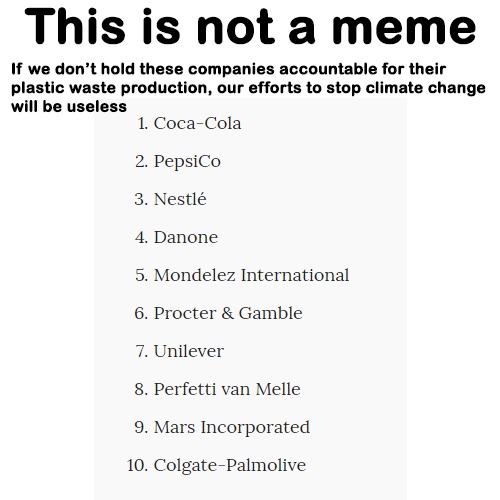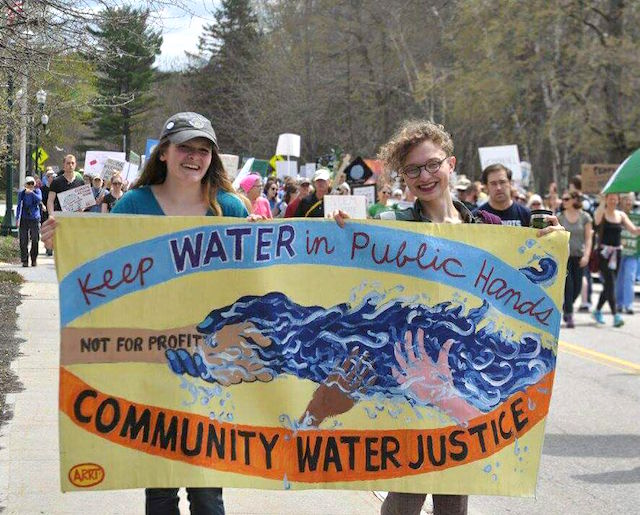“Friendly reminder that Nestle and others on that list use slave labor.
To anyone interested, go watch the documentary “The Dark Side of Chocolate.” It’s about the slave/child labor used by chocolate makers and by Nestle. Fascinating, I had to watch it for a class.
Don’t forget that Nestle used hired gunmen to kill their workers before.
Coca-Cola has also been accused of hiring hitmen from a right-wing paramilitary group between 1990 and 2002 to kill at least 10 trade union leaders.” ~ reddit comments, source: the Guardian.
Boycott Nestlé! That’s gonna be hard. Here’s a list of companies owned by Nestlé.
Original article follows:
Nestlé’s War on Water—4 Things we can Do.
In certain circumstances, I hear my mother’s voice in my head.
Her words were laced with a combination of wisdom, humor, and sarcasm, but they came from a place of concern, of seeing things others did not.
She was in love with nature and had an innate sense for injustice. She was a Scorpio and anytime she witnessed meanness, gossip, or anything that harmed the environment, the stinger came out.
I remember a litterbug receiving such an icy stare from her that they picked up their trash and disposed of it properly. She couldn’t pass an animal on the street without making sure it wasn’t lost. She was an environmentalist ahead of her time.
A few quotes from Ruthie, my mom, to illustrate my point:
“I don’t care what they say, turn off the lights. It’s a waste.”
“And where do they think all the damn plastic (mom didn’t swear, so this meant she was really, really mad!) is going anyway? It’s just a throwaway world.”
“The oil companies have too much power.”
“Put those grapes back. Until they can treat the people who pick them decently, we don’t support that industry.” (This was in reference to Cesar Chavez, a civil rights activist and co-founder of the National Farm Workers Association.)
The recent Facebook post on Michigan’s fight against Nestlé usurping their water and bottling it for profit is what brings her most prophetic and damning quote to mind:
“We are fighting for our damn oil in the Middle East. The next war will be over water.”
I believe it. I just don’t want to live to see it.
Poland Springs, a subsidiary of Nestlé Corporation, draws, or should I say steals, 603,000 gallons of water a day from an aquifer in Fryeburg, Maine.
The Maine Supreme Judicial Court upheld their right to purchase Maine groundwater for the next 45 years. On top of that, Maine handed Nestlé a seat on their State Environmental Board. Talk about betrayal.
Michigan is fighting the same battle on land where Native Americans have treaty rights. They are doing it in Ontario, Canada. Nestlé Pure Life bottles water from a spring in Millard Canyon, California, and again, this plant is located on a Native American reservation.
In 2013, they continued bottling water despite a record drought. According to a report filed by the California State Water Resources Control Board, the company is using seven times more water than it is permitted. And this is being done with an expired permit.
It’s happening, in Texas, Florida, and Southern France. And that’s just Nestlé.
Clean water is our right and a basic human need. It is being stolen and sold back to us by manufacturers who are buying it dirt cheap and claiming it as theirs. In other words, it is no longer public. Clean water is on the road to privatization.
Nestlé Chairman, Peter Brabeck said that water is “not a right” and should be given a “market value and privatized.”
The fact that we consume bottled water 2,000 times the cost of tap water gives Mr. Brabeck the impetus to push his agenda forward. The average cost for a gallon of bottled water is $7.50—that’s twice the cost of a gallon of regular gasoline.
It’s frightening to think that there might actually be an industry that is becoming more powerful than the oil industry. Mom would be appalled!
We baby boomers used to drink water out of the hose and we’re still here—getting older every day—talking about it.
How do we protect our right to free, clean drinking water, and force companies like Nestlé to stop exploiting us? As my mother used to say, “Hit them in the pocketbook.”
Yes, money talks. You can do small things. If enough of us do small things, they add up.
1. Start by buying a filtration system for your tap. Tap filtration systems can be purchased for as little as $19.40.
2. Next, buy a reusable container made out of something other than plastic.
3. As a reward for your investments, calculate the amount of money you spent on bottled water. Put it in a jar for one month. At the end of the month, count your money and buy something other than water.
4. If you want to take it one step further, try a little activism. I’ve put several of the products listed below on my boycott list. Anything with the Nestlé brand is obvious, but there are some that are not. They are:
Nutritional Supplements: Boost Kid Essential, Ovaltine, and Carnation Breakfast.
Water: Perrier (Sparkling); San Pellegrino Sparkling Water and flavored sparkling water; Poland Springs (Maine); Acqua Panna (in Tuscany, Italy, in “convenient” plastic bottles. The first uncarbonated water to be bottled in plastic!); Arrowhead (San Bernadino, California); Deer Park (Florida, South Carolina, Pennsylvania, Maryland); Ice Mountain (Michigan); Ozarka (Texas), and Zephyrhills (Florida).
Food: Buitone food products, California Pizza Kitchen, DiGiorno, Freshly, Hot Pockets, Jack’s, Lean Cuisine.
Ice Cream: Dreyer’s, Haagen-Dazs; Skinny Cow, Frosty Paw, and Edy’s.
Pet Food: Beyond (cats), Beggin’ Strips (dogs), Bella (dogs). Anything with the “Purina” brand on it.
Skincare: Proactiv; Cetaphil.
Pass this information on to friends and family, and once you’ve done this, write to Nestlé and let them know you don’t like their unethical business practices.
Although this is more complicated than boycotting green grapes, we are creatures of habit and we know what we like, and what we buy. Consider alternatives, even if it’s one product.
Be persistent. Don’t give up. Once we give up, we lose. And this is one instance where we don’t want oil and water to mix.


 Share on bsky
Share on bsky






Read 4 comments and reply